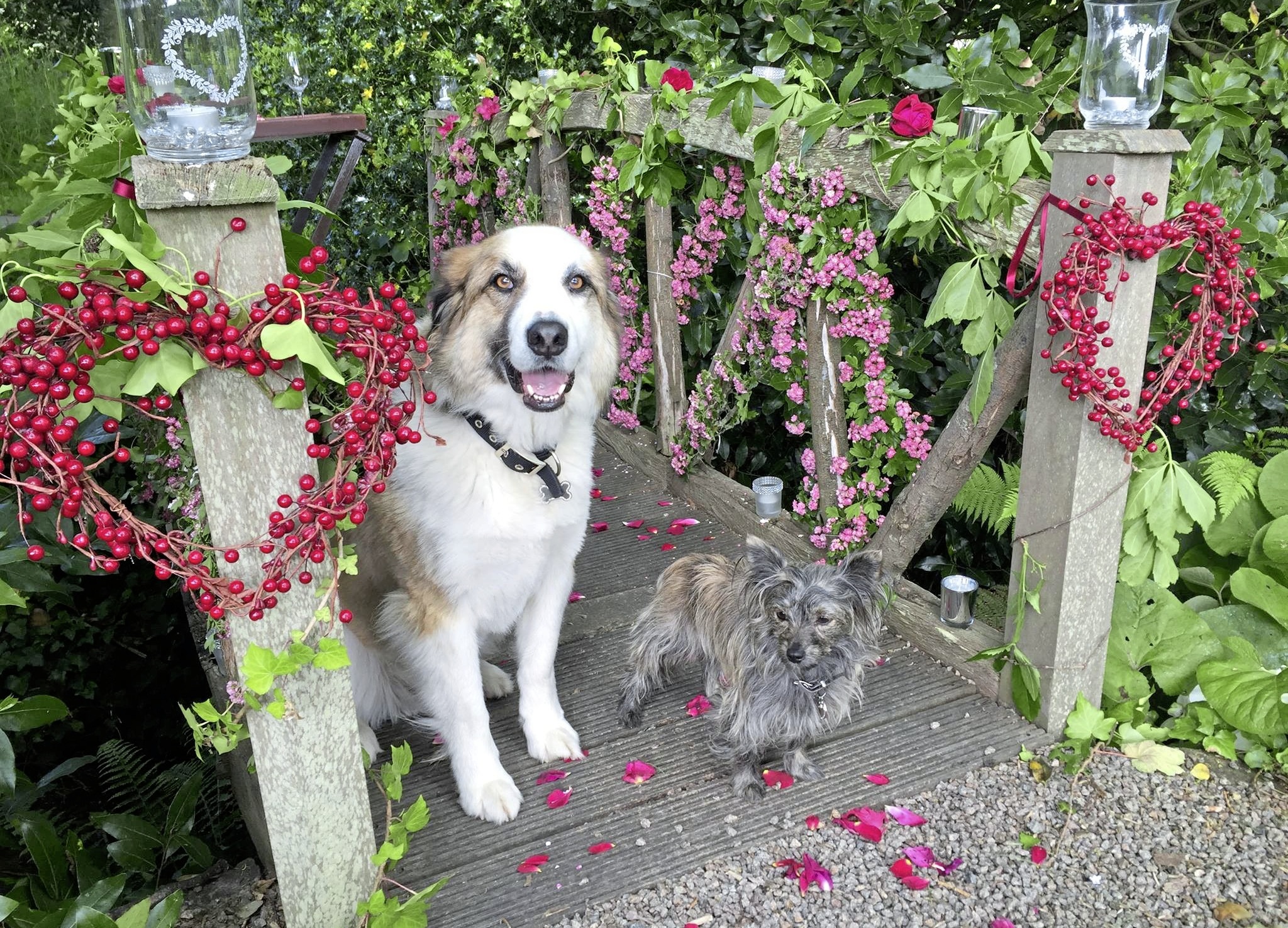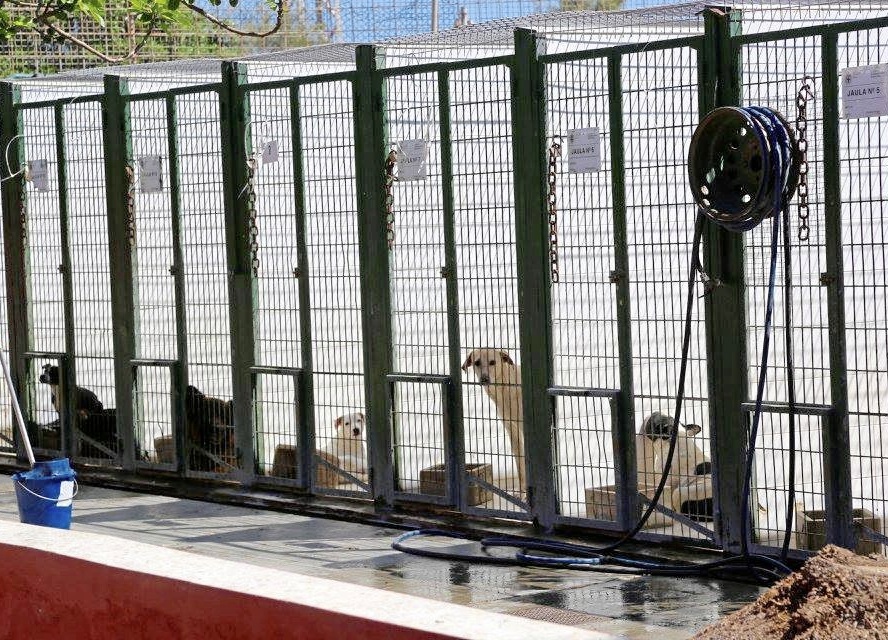A big fan of the Spanish water dog, Rebecca had travelled to the sun-kissed province of Cadiz in the south of the country to meet one of the top breeders of that dog type.
She stayed at the breeder’s ranch, where she was introduced to Theo, her pet-to-be. However, something else also caught her eye on the edge of the ranch – a group of dishevelled-looking dogs tethered together at the bottom of a dusty lane.
‘It all began for me when I bought my own dog from a breeder in Spain,’ says Rebecca (54), whose visits to that country would inspire her to formally co-found the canine charity, The Company of Dogs, in 2013.
‘While I was staying at the ranch in 2011, I spotted some dogs tied up at the end of the driveway. I asked the breeder about them and he explained that often at the end of the hunting season, dogs get dumped – and some people had dumped their dogs on the edge of his ranch.’

Spanish dogs, she has since discovered, are seen by many hunters as being no less disposable than dustbin bags.
‘Hunting is a big leisure pursuit in Spain and each hunter tends to have 15 to 20 dogs, which they use to hunt rabbits. But there’s big competition between hunters and if a dog isn’t performing as well as they feel it should be, they’ll just get rid of the dog – and they often do it quite brutally.’
The examples of cruelty inflicted on man’s best friend that Rebecca outlines are upsetting in the extreme.
‘When owners are trying to get rid of a dog which they may have been using for hunting other animals like rabbits, it is quite typical for them to drive the dog to a remote area, break one or both of the dog’s front legs and drive away. Once the leg is broken the dog can’t run after the car.
‘Some hunters will try to beat an unwanted dog to death, and rescue centres in Spain sometimes pick puppies out of bins because owners have thrown their pups in there.’
Asked why the behaviour of some dog owners in Spain is so abhorrent, she says: ‘Spain has this massive macho culture, with the bull runs and hunting, and quite a few people there simply don’t view animal cruelty in the same way that people do in much of the rest of Europe.’
As someone with a healthy curiosity and a natural affinity with animals, Rebecca, who grew up with an English bull terrier and a Westie, made it her mission to learn more about the predicament of Spain’s abandoned dogs.
‘I went with the breeder to an animal rescue centre run by an English lady. She told me she had recently rehomed a dog with someone in Jersey, so when I came back to Jersey I got in contact with that person.’

The lady in question was St Saviour resident and mum-of-two Joe Fry (47).
‘Joe had adopted a dog called Tim, a mongrel who looks like a mad hairball! She and I chatted and we realised there were many people in Jersey who would love to adopt a dog, but there weren’t enough adoptable dogs,’ adds Rebecca, who lives in Gorey with her dogs Theo, Ruby and a Spanish rescue dog called Cloud.
‘To go through the adoption process in the UK is tricky because UK rescues are more reluctant to adopt dogs to Jersey – if there are any problems, they have to take the dog back into the UK and the logistics of that can be difficult.’
Before they knew it, the blue prints – nay paw prints – for The Company of Dogs had been laid down.
‘I said, “Let’s not do anything until we’ve figured out how to do it”, but Joe’s quite impulsive. She called me and said, “I have a rescue dog in Spain I want to help”.
‘She opened a page on Facebook to promote him and we had 50 enquiries for him from Jersey residents. We found the dog, who is called Clive, the perfect home with a dog walker who likes skiing in the Alps. Clive now goes skiing with his owner every winter in the Alps – he’s got the perfect life.’
A second Spanish export soon followed.
‘We added another little dog on our Facebook pages and we found a good home for her – and at that point we realised it had started!
‘Next we brought over a group of five dogs, and then ten. After that we made the whole operation more polished and officially set up The Company of Dogs.
‘We are a not-for-profit charity and we have about 30 volunteers in Jersey. There is a board of ten and we have about 15 fundraisers here, as well as many good contacts in Spain.
‘They know the dogs we are looking for and they send us updates about what the dog is like – if the dog is good with kids, if it’s good with cats etc.’

To date, Rebecca and Joe have helped rehome almost 600 dogs, including in Jersey, Guernsey, France and Germany.
‘Quite often we take the dogs out of perreras – dog pounds – in Almeria ourselves because we tend to be aware of which dog is next on the list to be euthanised. We pay for the dog in question to go into a boarding kennel and then we put the dog’s image and profile up on our Facebook page.’
They adhere to a strict procedure for each dog that goes up for adoption.
‘They all have the rabies injection because they need that before they can get a pet passport, and they have the other normal vaccinations.
‘We ensure they also have a series of blood tests for Mediterranean diseases associated with dogs. As long as the dog is healthy and we have a suitable adopter in Jersey, we bring the dog over.’
The demand for adoptable dogs is so high that Rebecca and Joe charter a van to bring groups of dogs over, three to four times a year.
‘At the moment we bring over between 18-22 in one van, although we are trying to reduce that number to 16-18.’
She says the van and its driver are Defra approved, and adds: ‘All the dogs have to be signed out by the local area vet as fit for travel and we make sure they are wormed and the right tick flea treatments are applied.
‘The van driver has to have a set number of breaks during the journey and the dogs must be taken for walks for so many hours in any 24-hour period – and our driver is really good at doing that.’
The dogs are transported from St Malo to St Helier, before they are given a check-up by the States Vet in Jersey.
‘The van then takes them to the car park at Ransoms Garden Centre, where we arrange for the new owners to meet the dogs – and it can be a very emotional meeting,’ adds Rebecca, who separately runs the garden centre business alongside her sister, Katherine.
For many, the meeting at Ransoms represents the first time they will have seen their new dog in person, having first viewed its image on social media.

‘Once the dog’s profile is posted on The Company of Dogs’ Facebook page, people apply to adopt the dog and we send them an application form. It’s quite lengthy and can be quite probing. After they’ve completed the application we send two home-check co-ordinators to their home.’
She adds: ‘Not everyone gets the dog they want. We try to talk people through the process of owning dogs and some decide it is not for them at that point in time.
‘But we’ve made adopting dogs easy and those who adopt from us know that, should it go wrong, they can call us and we’ll listen.’
They may have taken much of the stress out of dog adoption, but is there not a risk that Jersey could become overburdened with dogs in future?
Rebecca is unequivocal in her answer.
‘If we’re bringing in anywhere between 16-20 dogs, how many litters does that equate to in Jersey? That is only the equivalent of maybe four litters in every three months. Far more dogs are brought into Jersey from the UK, but that can never be monitored.
‘So I don’t think we are adding to the demand, we are just an alternative for those who are already looking at purchasing a dog in the UK.’
Rebecca says it costs £400 for someone in Jersey to adopt a pet from The Company of Dogs.
‘Part of the adoption donation in Jersey includes a four-week training package with pet training company Fun 4 Dogs,’ she explains. ‘It costs us about £700 to bring a dog into Jersey. The reason we pegged it at £400 is that we don’t want the rescue dog to cost more than a puppy-farmed puppy. Our biggest bone of contention is people casually buying puppies online and bringing them into Jersey because we know those dogs have come from puppy farms.’
In the UK, the puppy farming industry is a big, but ethically questionable, business.
Puppy farmers are high-volume breeders who rear puppies with little or no regard for the health and welfare of the puppies or their parents, and the Kennel Club has warned that 20 per cent of puppies sold over the internet suffer from parvovirus, an often fatal disease.
‘People can be very gullible and have got used to buying many things online, but puppy farming is an awful industry and the parents of the dogs – especially the mothers – really suffer,’ adds Rebecca.
‘You don’t know how healthy the puppy is either. Why buy a puppy online that you know nothing about when you can rescue a dog that already exists?
‘We’re always all about the dogs that have the least amount of options so we’ll equally happily take a ten-year-old rescue dog as we would a five-month-old puppy from Spain – as long as we feel the dog is right for Jersey.’
Rebecca and Joe can only put up for adoption a limited number of dogs each year, so just how difficult is it to leave the others behind in Spain?
‘It’s very hard,’ admits Rebecca. ‘Quite often we will go round the perreras and we have to mentally block certain things out because you know that quite a lot of those dogs you see are never going to come out.’
They can, however, take solace from the knowledge that they have helped to change the fortunes of hundreds of previously destitute dogs, including Timo, a mongrel whose owner had tried – and failed – to kill him in the most barbaric manner.
‘He was found in a quarry lying next to a big stone that had blood on it. His head had been partially caved in by his own owner.
‘Someone had come along and may have disturbed the owner, and the dog was nursed back to health by a rescue group in Almería. We put his story up on our Facebook page and he has since been adopted over here – he’s a lovely dog and he’s healthy now.’
Tales like Timo’s are the reason why Rebecca allows The Company of Dogs to fill her every spare waking minute.
‘By the time I’ve finished the working day at Ransoms and by the time I’ve finished with all things to do with The Company of Dogs, it can be 2 am in the morning!’ adds Rebecca, who represents the third generation of her family to have attained the prestigious Kew diploma in horticulture, after her dad and granddad.
‘That’s because they operate different hours in Spain. When I’m at work at Ransoms, people in Spain tend to be in bed having their siesta.
‘Generally I’m working until 10 or 11 pm, seven days a week and sometimes it can be a bit more of a tie than you want, but when you go out to Spain and you see what is happening to the dogs, you put that to one side.’






